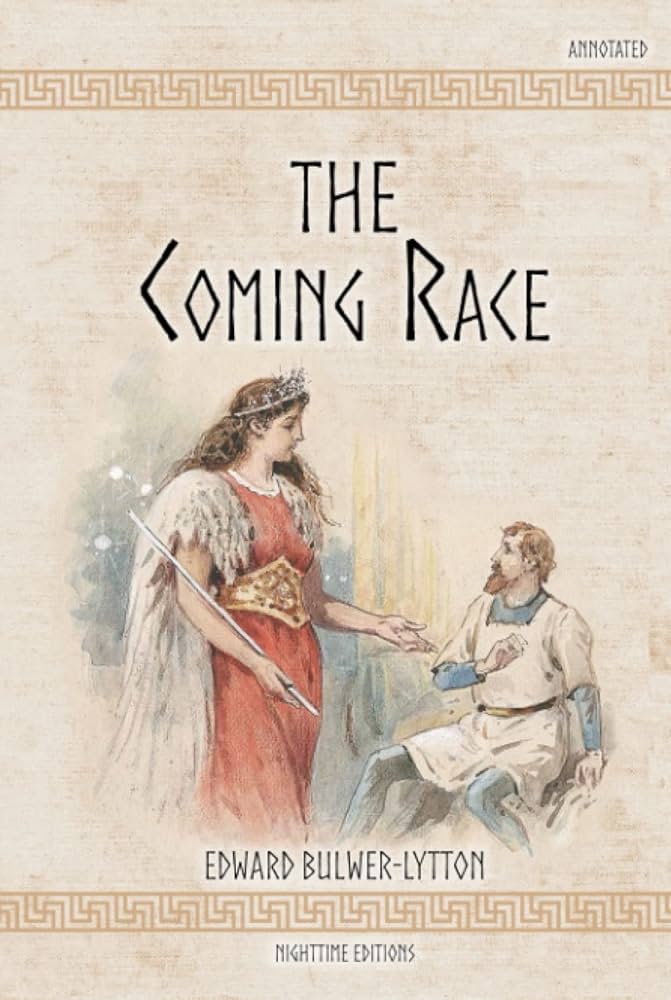Chapter IX — The coming Race
byChapter IX opens with a revealing look at the dietary customs of the Ana, the people of this subterranean world, whose food choices reflect not only physical sustenance but moral principle. To consume the flesh of animals is viewed by them as repugnant, a regression into primitive cruelty. Instead, they nourish themselves with foods derived from complex vegetable compounds and mineral infusions. These are not simple crops as known on the surface but the result of calculated chemistry and botanical advancement. Even the flavor and texture of meats can be replicated through science, yet without any loss of moral purity or nutritional value. What they prepare bears little resemblance to earthly cuisine but accomplishes its goal with elegance and efficiency. This refined system of nourishment is built not merely for taste or tradition but around a societal dedication to compassion, balance, and biological sustainability.
The nutritional science of the Ana includes a careful blend of minerals like lime, chosen for their bodily benefits and incorporated into otherwise gentle, easy-to-digest food. Their botanical experimentation produces a range of novel plants, many lacking in bright colors but rich in form and function. These plants not only serve the culinary arts but also represent how far the Ana have gone in merging ethics with biology. Food is not simply fuel—it is an expression of identity and values. With the ability to imitate surface tastes using non-animal matter, the Ana remove the need for slaughter, placing their society firmly beyond violent survival instincts. This transformation of diet speaks to their cultural evolution, showing that technology alone does not define advancement—compassion plays a central role. And so, what they eat becomes symbolic of who they are: a society that has chosen kindness without sacrificing sophistication or health.
Curiously, the same race that has perfected nutrition once flirted dangerously with destructive technologies. Ancient accounts hint that their ancestors, in mastering explosive compounds, unleashed a calamity that nearly erased them. This grim lesson led to an outright ban, formalized by the College of Sages, against creating anything that could produce explosive force. Despite this, the ingredients of such compounds are still kept in scientific repositories. The reasoning is philosophical—knowledge, even of dangerous things, remains inherently valuable. Their restraint lies not in ignorance but in wisdom, balancing the pursuit of truth with the obligation to avoid misuse. This is not hypocrisy but a living memory of how brilliance, untempered by ethics, can destroy even the most advanced civilizations. Thus, their reverence for knowledge is filtered through a moral lens.
In a similar act of precaution, the creation of aerial vessels has also been forbidden. Though their advanced understanding of vril and mechanics could easily lead to airborne transport, they avoid it due to the risk of resurrecting devastating weapons or unleashing powers beyond control. A few rebellious thinkers occasionally attempt to unravel the mysteries of flight, but these efforts are met with cultural fear rather than formal punishment. Superstition, grounded in history’s trauma, serves as an effective deterrent. Still, among the Vril-ya there exists a hopeful vision that someday their descendants will master the skies in peace. They believe that when the Ana evolves further—intellectually and spiritually—he will journey beyond this planet. Space, then, will become the new frontier, not through conquest, but as a natural step in their cosmic maturation. This hope reflects not ambition alone, but the belief that the vril energy within them is meant for a destiny grander than confined earthly life.
The idea that flight will one day be possible without danger shows how imagination persists even in a society ruled by logic and caution. They envision vehicles that can defy gravity without creating harm, powered by refined forces rather than combustion or explosion. Theirs is not a dream of escape, but of expansion—of extending peace and intelligence outward. The Ana believe the soul of their race is still evolving, and with it, their understanding of the universe. One day, they believe, matter will yield to willpower so completely that the air itself will welcome them. These dreams aren’t merely scientific; they are deeply spiritual aspirations. They symbolize the harmony between power and restraint, ambition and responsibility, that defines the Ana way of life. Through this harmony, they hope to explore the stars not as conquerors, but as rightful citizens of a vast and mysterious cosmos.


